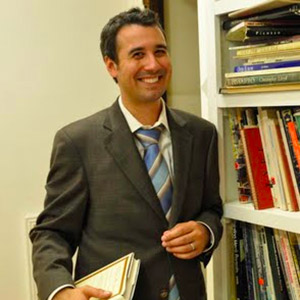
Michael Tiboris
Michael Tiboris studied philosophy, political science, and integrated liberal studies at the University of Wisconsin, Madison, and later earned a master’s and Ph.D. in philosophy from UCSD. He has taught philosophy at UCSD, CSULB, and SDSU and believes in the public university mission.
“I feel especially proud to contribute to the CSU system, which has been conscientiously providing excellent access to higher education for an evolving, ever-growing student body. My main areas of academic interest are in ethics and political philosophy, as well as education policy and reform,” says Tiboris.
Tiboris also teaches classes at Osher that provide an introduction to philosophical topics – they offer a condensed version of what he teaches his undergraduate students. He adds, “I’m very conscious of the idea that the best part of philosophical education is testing out the ideas, discussing them, and trying to make sense out of them in the context of our own lives, so the Osher courses I offer provide plenty of opportunity for this and are designed to get students thinking about how these sometimes-abstract philosophical theories are relevant for them now.”
This semester, Tiboris is offering Introduction to Modern Philosophy, which covers some of the major traditions in philosophy between the 17th and 20th centuries. Students discuss two different philosophical projects in this period – ethics and epistemology (the study of knowledge). The course also provides an opportunity to experience the work of major philosophical figures, including Immanuel Kant, whose works are massively influential but widely seen as inaccessible. “I’m going to make sense of Kant, along with other major figures including Descartes, Locke, Hume, and Leibniz, as well as some post-Kantian figures such as Nietzsche and Sartre,” says Tiboris.
Additionally, Tiboris is lecturing on the ethics of water. He adds, “I hope to explain both the challenges and limitations for water development in Southern California (the most successful desert civilization in the history of the human race), as well as consider the potential ethical problems of resource and environmental justice in a time of scarcity.” Tiboris enjoys talking about philosophy with students of any age, and the number one benefit he gets is simply the pleasure of teaching students who want to learn. As someone whose typical student is in his or her early 20s, the unique perspective of Osher students interests Tiboris a great deal, and he’s curious to see what kinds of patterns of difference (if any) there are in their philosophical intuitions. Tiboris says, “You don’t really have a choice about whether you’re going to continue learning. That’s a fact of human life since we never get to a point where we know it all; however, we do have the ability to decide what sorts of things we’d like to focus our attention on, and Osher provides us with structured opportunities and launching points. My suspicion is that Osher attracts those who already believe continued learning is important, and who are motivated and exhilarated by the prospect of making it happen.”
Why Study Philosophy?
By Michael Tiboris
I’m sure my parents were unsure about my decision to become a professional philosopher. At first, my father gently (and then less gently) suggested law school. But after he saw how much joy it gave me, he made an earnest effort to understand. In the intervening years I have had the distinct pleasure of introducing a worldly and educated man to philosophical classics. This has really changed his outlook and become a great source of joy for him. I think I can share this with others as well, people who are curious and thoughtful, but who haven’t had the opportunity to spend some serious time with these humanistic classics or someone who knows a lot about them. Long story short, Osher allows us to do philosophy the way it ought to be done –earnestly and without worrying too much about how it fits into your career.